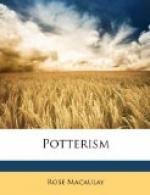But I talked to a few other people about it, on whose discretion I could rely. I tried to find out, and so did Percy, what was this man’s record. What transpired of it was not reassuring. His father was, as we knew before, a naturalised Russian Jew, presumably of the lowest class in his own land, though well educated from childhood in this country. He was, as every one knew, a big banker, and mixed up, no doubt, with all sorts of shady finance. Some people said he was probably helping to finance the Bolsheviks. His daughter had married a Russian Jewish artist. Jane knew this artist and his wife well, at that silly club of hers. Arthur Gideon, on coming of age, had reverted to his patronymic name, enamoured, it seemed, of his origin. He had, of course, to fight in the war, loath though he no doubt was. But directly it was over, or rather directly he was discharged wounded, he took to shady journalism.
Hardly a reassuring record! Add to it the ill-starred influence he had always attempted to exert over Johnny and Jane (he had, even in Oxford days, brought out their worst side) his quarrels with Oliver in the press, his unconcealed hatred of what he was pleased to call ‘Potterism’ (he was president of the foolish so-called ’Anti-Potter League’), his determined intimacy with Jane against her husband’s wishes, and Jane’s own implication that he at times drank too much—and you had a picture of a man unlikely to inspire confidence in any impartial mind.
Anyhow, most of the people to whom I broached the unpleasant subject (and I saw no reason why I should not speak freely of my suspicion) seemed to think the man’s guilt only too likely.
Some of my friends said to me, ’Why not bring a charge against him and have him arrested and the matter thoroughly investigated?’ But Percy told me we had not enough to go on for that yet. All he would do was to put the investigation into the hands of a detective, and entrust him with the business of collecting evidence.
The only people we kept the matter from were our two daughters. Clare would have been too dreadfully upset by this raking up of the tragedy, and Jane could not, in her present state, be disturbed either.
8
About three weeks after my visit to Amy Ayres, I had rather a trying meeting with that young clergyman, Mr. Juke, another of the children’s rather queer Oxford friends. He is the son of that bad old Lord Aylesbury, who married some dreadful chorus girl a year or two ago, and all his family are terribly fast. We met at a bazaar for starving clergy at the dear Bishop of London’s, to which I had gone with Frank. I think the clergy very wrong about many things, but I quite agree that we cannot let them starve. Besides, Peggy had a stall for home-made jam.
I was buying some Armenian doily, with Clare at my side, when a voice said, ‘Can I speak to you for a moment, Lady Pinkerton?’ and, turning round, Mr. Juke stood close to us.




